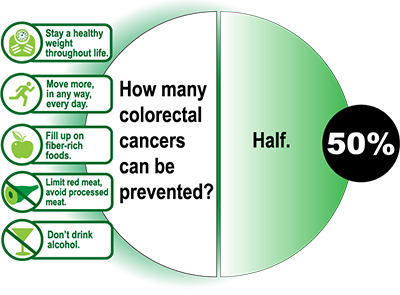For those who have had possible precancerous growths removed from their colon/rectum — common among adults — taking vitamin D and/or calcium supplements does not reduce the risk of developing further growths, finds a randomized study reported in the New England Journal Of Medicine. The multi-year trial adds to the evidence that supplements do not protect against colorectal cancers.
While there are many reasons to take supplements, AICR recommends not to rely on supplements for cancer protection.
The 2,259 people in this study all had colorectal abnormal growths, called adenomas or polyps. Some of these growths on the lining of the colon or rectum could eventually lead to colorectal cancer, which is why they are commonly removed.
Within four months of having the polyps removed, the participants (who were 45 to 75 years old) were placed into a group where he/she took a daily dietary supplement of vitamin D, calcium, both or neither. The study was blinded so neither the researchers nor participants knew what they were taking. And when they joined the study, everyone had normal levels of calcium or vitamin D.
Participants were given 1,000 International Units (IUs) of vitamin D and 1,200 milligrams of calcium. For calcium, that’s about the amount adults are recommended to take in daily from their foods: 1000-1200 milligrams, depending upon your age and sex. Daily vitamin D recommended levels are 600 IUs – for adults under 70.
In all, 43 percent of patients had polyps when the follow-up colonoscopy was given three to five years later. There was no difference in the frequency of new polyps between the participants in a control group and participants who had taken one or both supplements.
The authors had hypothesized that supplementation would make a difference because previous lab studies have shown that vitamin D and/or calcium protects against colon tumors. Human studies have not consistently shown these supplements link to lower cancer risk, although some have, but many were relatively short and/or small. One of the positive human trials on calcium supplements and lower colorectal cancer risk was conducted years ago by the same study researchers, so this lack of a link seen here was more unexpected, they write.
Yet this trial only included people with a recent history of colorectal polyps, and the findings might not apply to people without this, they note.
This study accompanies another supplement-focused paper in the same issue of the New England Journal of Medicine that finds an estimated 23,000 US emergency room visits every year are due to adverse events related to dietary supplements. Supplements for weight loss or energy products lead to the most common ER visits and these involved heart issues.
 For colorectal cancer prevention, AICR research shows that eating a diet high in fiber, staying a healthy weight and being active are among the steps people can take to reduce their risk. Visit Learn More About Colorectal Cancer for more.
For colorectal cancer prevention, AICR research shows that eating a diet high in fiber, staying a healthy weight and being active are among the steps people can take to reduce their risk. Visit Learn More About Colorectal Cancer for more.
The New England Journal of Medicine colorectal cancer supplement study was funded by a grant from the National Cancer Institute.





